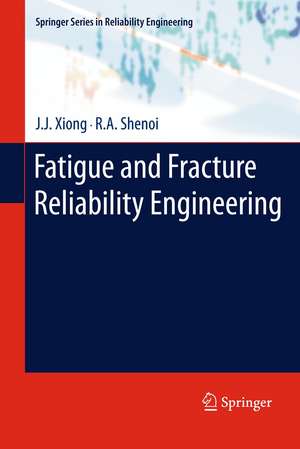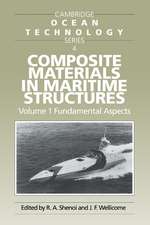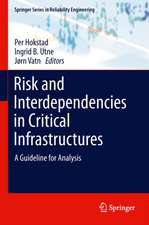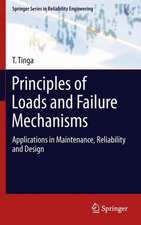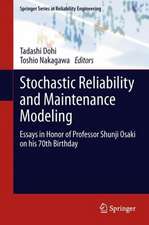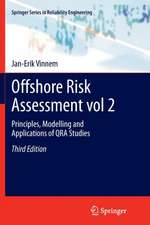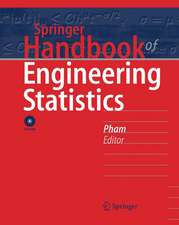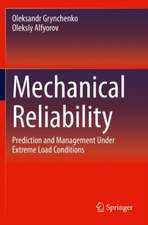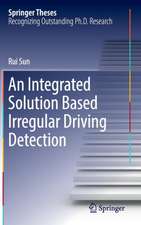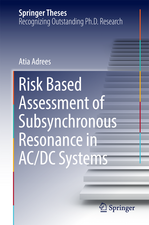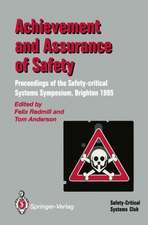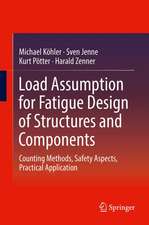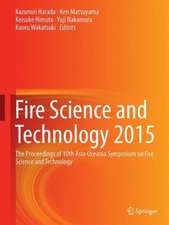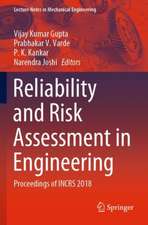Fatigue and Fracture Reliability Engineering: Springer Series in Reliability Engineering
Autor J.J. Xiong, R. a. Shenoien Limba Engleză Paperback – 25 feb 2013
A series of original and practical approaches, are suggested in Fatigue and Fracture Reliability Engineering, including new techniques in determining fatigue and fracture performances. It also carries out an investigation into static and fatigue properties, and into the failure mechanisms of unnotched and notched CFR composite laminates with different lay-ups to optimize the stacking sequence effect. Further benefits include:
- a novel convergence-divergence counting procedure to extract all load cycles from a load history of divergence-convergence waves;
- practical scatter factor formulae to determine the safe fatigue crack initiation and propagation lives from the results of a single full-scale test of a complete structure; and
- a nonlinear differential kinetic model for describing the dynamical behaviour of an atom at a fatigue crack tip.
| Toate formatele și edițiile | Preț | Express |
|---|---|---|
| Paperback (1) | 1104.74 lei 43-57 zile | |
| SPRINGER LONDON – 25 feb 2013 | 1104.74 lei 43-57 zile | |
| Hardback (1) | 1109.16 lei 43-57 zile | |
| SPRINGER LONDON – 24 ian 2011 | 1109.16 lei 43-57 zile |
Din seria Springer Series in Reliability Engineering
- 18%
 Preț: 1122.56 lei
Preț: 1122.56 lei - 20%
 Preț: 1277.89 lei
Preț: 1277.89 lei - 20%
 Preț: 987.32 lei
Preț: 987.32 lei - 18%
 Preț: 1406.66 lei
Preț: 1406.66 lei - 24%
 Preț: 1048.67 lei
Preț: 1048.67 lei - 20%
 Preț: 940.32 lei
Preț: 940.32 lei - 18%
 Preț: 952.09 lei
Preț: 952.09 lei -
 Preț: 313.32 lei
Preț: 313.32 lei - 18%
 Preț: 951.29 lei
Preț: 951.29 lei - 18%
 Preț: 947.02 lei
Preț: 947.02 lei - 15%
 Preț: 651.51 lei
Preț: 651.51 lei - 18%
 Preț: 1228.44 lei
Preț: 1228.44 lei - 18%
 Preț: 1227.67 lei
Preț: 1227.67 lei - 18%
 Preț: 952.89 lei
Preț: 952.89 lei - 18%
 Preț: 1234.94 lei
Preț: 1234.94 lei - 18%
 Preț: 1236.19 lei
Preț: 1236.19 lei - 18%
 Preț: 952.09 lei
Preț: 952.09 lei - 15%
 Preț: 635.65 lei
Preț: 635.65 lei - 20%
 Preț: 1274.57 lei
Preț: 1274.57 lei - 18%
 Preț: 1322.35 lei
Preț: 1322.35 lei - 15%
 Preț: 643.34 lei
Preț: 643.34 lei - 18%
 Preț: 1109.16 lei
Preț: 1109.16 lei - 15%
 Preț: 635.65 lei
Preț: 635.65 lei - 15%
 Preț: 654.62 lei
Preț: 654.62 lei - 18%
 Preț: 944.99 lei
Preț: 944.99 lei - 18%
 Preț: 953.65 lei
Preț: 953.65 lei - 18%
 Preț: 956.50 lei
Preț: 956.50 lei - 15%
 Preț: 644.95 lei
Preț: 644.95 lei - 18%
 Preț: 950.52 lei
Preț: 950.52 lei - 18%
 Preț: 1233.97 lei
Preț: 1233.97 lei - 15%
 Preț: 640.06 lei
Preț: 640.06 lei - 18%
 Preț: 956.69 lei
Preț: 956.69 lei - 18%
 Preț: 940.39 lei
Preț: 940.39 lei - 18%
 Preț: 948.92 lei
Preț: 948.92 lei -
 Preț: 389.70 lei
Preț: 389.70 lei - 18%
 Preț: 943.73 lei
Preț: 943.73 lei - 18%
 Preț: 1213.16 lei
Preț: 1213.16 lei - 18%
 Preț: 940.57 lei
Preț: 940.57 lei - 20%
 Preț: 985.03 lei
Preț: 985.03 lei - 18%
 Preț: 943.43 lei
Preț: 943.43 lei - 18%
 Preț: 1218.21 lei
Preț: 1218.21 lei - 18%
 Preț: 948.16 lei
Preț: 948.16 lei - 18%
 Preț: 948.92 lei
Preț: 948.92 lei - 18%
 Preț: 1727.24 lei
Preț: 1727.24 lei - 15%
 Preț: 638.43 lei
Preț: 638.43 lei
Preț: 1104.74 lei
Preț vechi: 1347.24 lei
-18% Nou
Puncte Express: 1657
Preț estimativ în valută:
211.39€ • 221.30$ • 174.91£
211.39€ • 221.30$ • 174.91£
Carte tipărită la comandă
Livrare economică 07-21 aprilie
Preluare comenzi: 021 569.72.76
Specificații
ISBN-13: 9781447126256
ISBN-10: 1447126254
Pagini: 228
Ilustrații: XIV, 214 p.
Dimensiuni: 155 x 235 x 12 mm
Greutate: 0.33 kg
Ediția:2011
Editura: SPRINGER LONDON
Colecția Springer
Seria Springer Series in Reliability Engineering
Locul publicării:London, United Kingdom
ISBN-10: 1447126254
Pagini: 228
Ilustrații: XIV, 214 p.
Dimensiuni: 155 x 235 x 12 mm
Greutate: 0.33 kg
Ediția:2011
Editura: SPRINGER LONDON
Colecția Springer
Seria Springer Series in Reliability Engineering
Locul publicării:London, United Kingdom
Public țintă
ResearchCuprins
1. Deterministic Theorem on Fatigue and Fracture.- 2. Reliability and Confidence Levels of Fatigue Life.- 3. Principles Underpinning Reliability based Prediction of Fatigue and Fracture Behaviours.- 4. Data Treatment and Generation of Fatigue Load Spectrum.- 5. Reliability Design and Assessment for Total Structural Life.- 6. Reliability Prediction for Fatigue Damage and Residual Life in Composites.- 7. Chaotic Fatigue.
Notă biografică
Professor J.J. Xiong is head of the Aircraft Structure Safety and Reliability Group in the School of Transportation Science and Engineering, professor and doctoral supervisor at Beihang University, China. He graduated in 1986 with a BSc degree from Northwest Polytechnic University, then worked for the Institute of Helicopter Design and Research from 1986 to 1989. From 1989 to 1995, he worked for academic degrees at Beihang University; since then he has been working at Beihang University as a post-doctoral researcher, an associate professor and a professor. He is a doctoral supervisor in aircraft design. He worked in the University of Southampton, UK, for two years as a senior visiting research fellow.
Professor Xiong's research interests include fatigue and fracture reliability of metallic and composite structures; mechanics of RTM composite structures; repair design for notched structures with bonded composites; and numerical modelling on fluid-solid-electromagnetism interaction. As a chief investigator, he has been engaged in a number of research projects sponsored by the National Natural Science Foundation, the National Defense Science Foundation, the Aeronautics Science Foundation of China, etc.
Professor R.A. Shenoi holds the Chair of Lightweight Structures within the Fluid-Structure Interaction Research Group in the School of Engineering Sciences at the University of Southampton. He obtained his BTech degree from IIT Kharagpur in 1974 and his PhD from the University of Strathclyde, Glasgow, in 1981. Since 1981, he has been at the University of Southampton as lecturer, senior lecturer, reader and professor. He is a Fellow of both the Royal Institution of Naval Architects and the Institution of Mechanical Engineers.
His research work aims to understand the mechanics of FRP structures and can be classified under three broad headings. The first of these deals with understanding the strength of large structural elements andthe progressive nature of damage build-up. Secondly, he is involved with modelling the long-term behaviour of structures – creep, fatigue and fracture aspects in air, and under hygrothermal environments. The third area of study deals with design for production issues and the simulation of process modelling in automated FRP production. He serves on the editorial board of the Journal of Strain Analysis and is a long-standing, invited, member of the technical panels and committees of the International Ship and Offshore Structures Congress.
Professor Xiong's research interests include fatigue and fracture reliability of metallic and composite structures; mechanics of RTM composite structures; repair design for notched structures with bonded composites; and numerical modelling on fluid-solid-electromagnetism interaction. As a chief investigator, he has been engaged in a number of research projects sponsored by the National Natural Science Foundation, the National Defense Science Foundation, the Aeronautics Science Foundation of China, etc.
Professor R.A. Shenoi holds the Chair of Lightweight Structures within the Fluid-Structure Interaction Research Group in the School of Engineering Sciences at the University of Southampton. He obtained his BTech degree from IIT Kharagpur in 1974 and his PhD from the University of Strathclyde, Glasgow, in 1981. Since 1981, he has been at the University of Southampton as lecturer, senior lecturer, reader and professor. He is a Fellow of both the Royal Institution of Naval Architects and the Institution of Mechanical Engineers.
His research work aims to understand the mechanics of FRP structures and can be classified under three broad headings. The first of these deals with understanding the strength of large structural elements andthe progressive nature of damage build-up. Secondly, he is involved with modelling the long-term behaviour of structures – creep, fatigue and fracture aspects in air, and under hygrothermal environments. The third area of study deals with design for production issues and the simulation of process modelling in automated FRP production. He serves on the editorial board of the Journal of Strain Analysis and is a long-standing, invited, member of the technical panels and committees of the International Ship and Offshore Structures Congress.
Textul de pe ultima copertă
Fatigue and Fracture Reliability Engineering is an attempt to present an integrated and unified approach to reliability determination of fatigue and fracture behaviour, incorporating probability, statistics and other related areas.
A series of original and practical approaches, are suggested in Fatigue and Fracture Reliability Engineering, including new techniques in determining fatigue and fracture performances. It also carries out an investigation into static and fatigue properties, and into the failure mechanisms of unnotched and notched CFR composite laminates with different lay-ups to optimize the stacking sequence effect. Further benefits include:
A series of original and practical approaches, are suggested in Fatigue and Fracture Reliability Engineering, including new techniques in determining fatigue and fracture performances. It also carries out an investigation into static and fatigue properties, and into the failure mechanisms of unnotched and notched CFR composite laminates with different lay-ups to optimize the stacking sequence effect. Further benefits include:
- a novel convergence-divergence counting procedure to extract all load cycles from a load history of divergence-convergence waves;
- practical scatter factor formulae to determine the safe fatigue crack initiation and propagation lives from the results of a single full-scale test of a complete structure; and
- a nonlinear differential kinetic model for describing the dynamical behaviour of an atom at a fatigue crack tip.
Caracteristici
Presents new techniques for the determination of fatigue and fracture performances Gives an integrated and unified approach to reliability determination of fatigue and fracture behaviour through probability and statistics Presents a novel convergence-divergence counting procedure to extract all load cycles from a load history of divergence-convergence waves Includes supplementary material: sn.pub/extras
